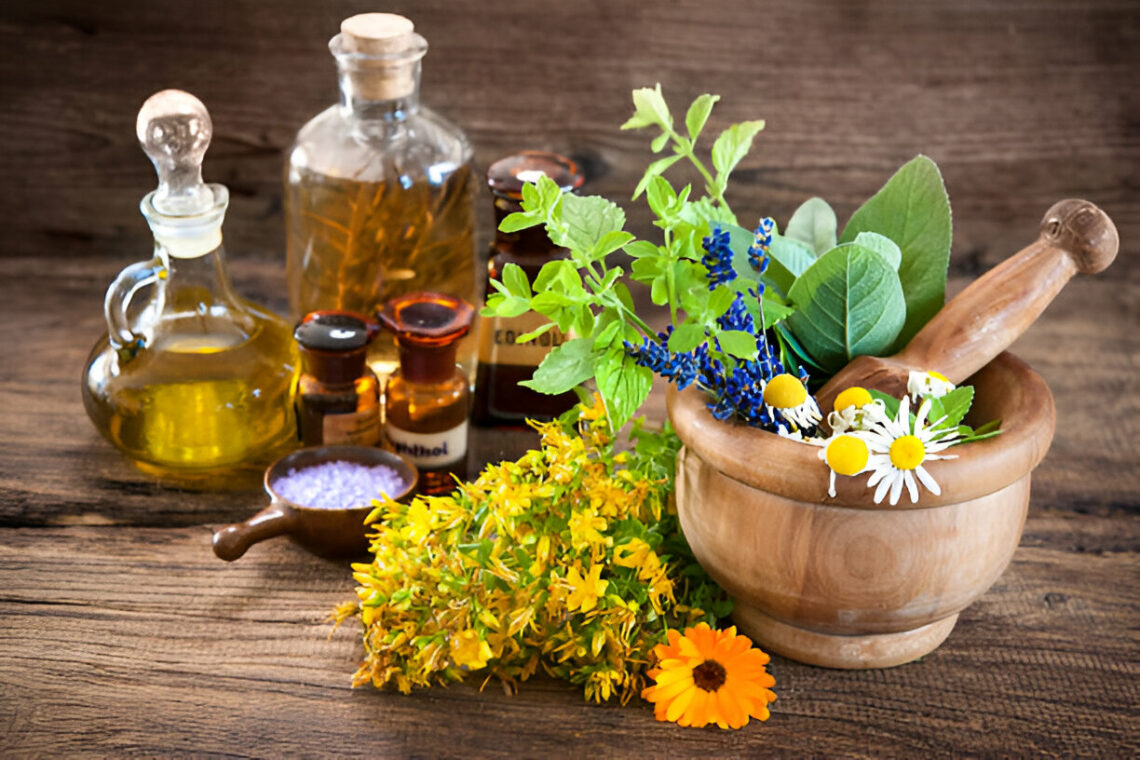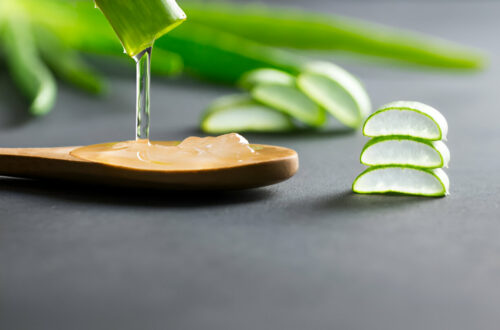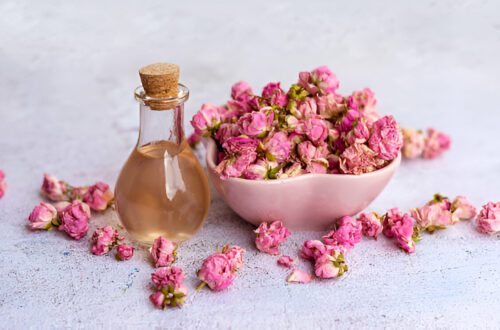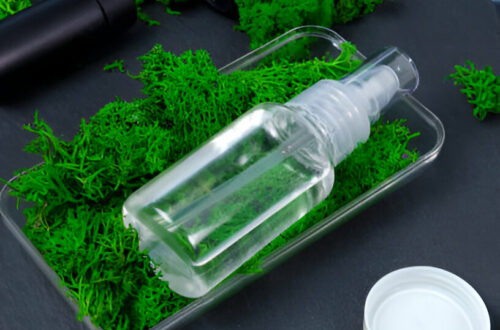The skin is our body’s largest organ, acting as the first barrier against the outside world. Many people want their skin to look vibrant and feel smooth. While there are many skincare products available in stores, natural herbs are also worth considering.
Herbs are a natural way to refresh your beauty routine for clear, healthy skin. Known for their healing properties, herbs have been used for centuries to treat various skin and health conditions. When applied to the skin, herbal remedies can offer anti-inflammatory, antibacterial, hydrating, and wound-healing benefits. Unless you’re allergic or sensitive, herbs can be a gentler alternative to prescription skin treatments. If you have any concerns, talk to your dermatologist or doctor before using them.
There are many herbs available to treat common skin issues like acne, eczema, and sunburns. Even if your skin is generally healthy, adding herbs to your routine can improve its tone and texture.
In this article, we’ll look at some of the best herbs for skin care and how you can add them to your routine.
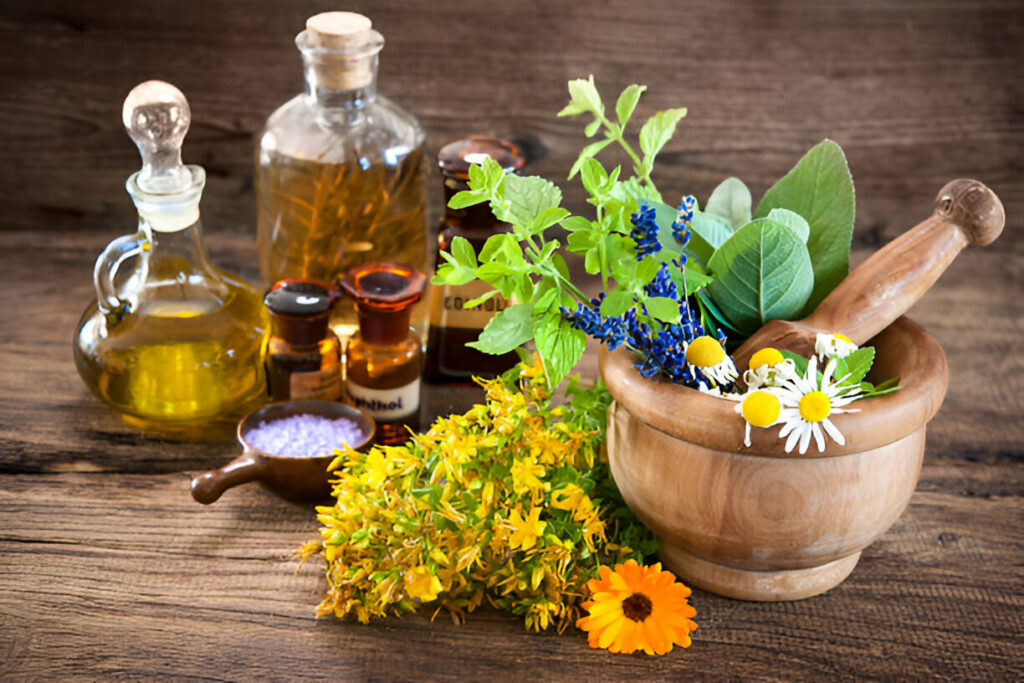
Aloe Vera
This gel-like solution does more than just soothe sunburns. Aloe vera, often referring to the gel from the plant, is rich in vitamins A, C, E, and B12 and has anti-inflammatory properties. It helps boost collagen production, speeding up wound healing and reducing scarring from minor burns and skin irritations. Aloe vera is a popular natural treatment for conditions like acne, eczema, rashes, and psoriasis. It’s also packed with antioxidants to protect against sun damage and slow down skin aging. Additionally, it has antifungal and antibacterial benefits.
A 2019 study showed that aloe vera can speed up wound recovery and reduce the risk of infection, redness, and irritation. Aloe vera skin care is effective because the gel is about 98% water, which helps keep your skin hydrated. However, using too much aloe vera can actually dry out your skin, so it’s best to use it in moderation. For burns or rashes, apply aloe vera to the affected area 1-3 times a day. Some people use it daily, but it’s a good idea to check with your dermatologist to see if this is right for you.
Ashwagandha
Ashwagandha is well-known for its stress-relieving benefits and is rich in antioxidants. It’s classified as an adaptogen, a type of herb that helps reduce stress and fatigue. Ashwagandha has been used for thousands of years in Ayurvedic medicine, especially in India, the Middle East, and Africa. It’s often taken as a supplement or as a powder that can be added to food or tea. Many skincare products also include ashwagandha powder for topical use.
Ashwagandha has anti-inflammatory, antibacterial, and cortisol-lowering effects. These benefits help prevent acne caused by bacteria and hormone imbalances. It also boosts collagen production, reducing scarring and redness, smoothing your skin’s texture, and slowing down aging.
To add ashwagandha to your routine, try using a moisturizer or beauty oil that contains it.
Calendula
Calendula oil, made from the pot marigold flower, supports skin healing, hydration, and protection for a youthful glow. Its anti-inflammatory properties help prevent acne, skin rashes, dryness, and soothe irritations from conditions like eczema and rosacea. For enhanced benefits, consider integrating rose water for face and rose skin care into your routine. This natural remedy is rich in flavonoids and carotenoids, which give the oil its bright orange color. These antioxidants help boost collagen production and protect your skin from sun damage, uneven texture, and infections.
As a key ingredient in Zensa Healing Cream, calendula oil is also known for promoting wound healing. It’s rich in calendic and linoleic fatty acids, which help the skin absorb nutrients and retain moisture, keeping it smooth, even, and hydrated. These benefits prevent water loss, dryness, and cracked skin, which can make your skin more prone to infection.
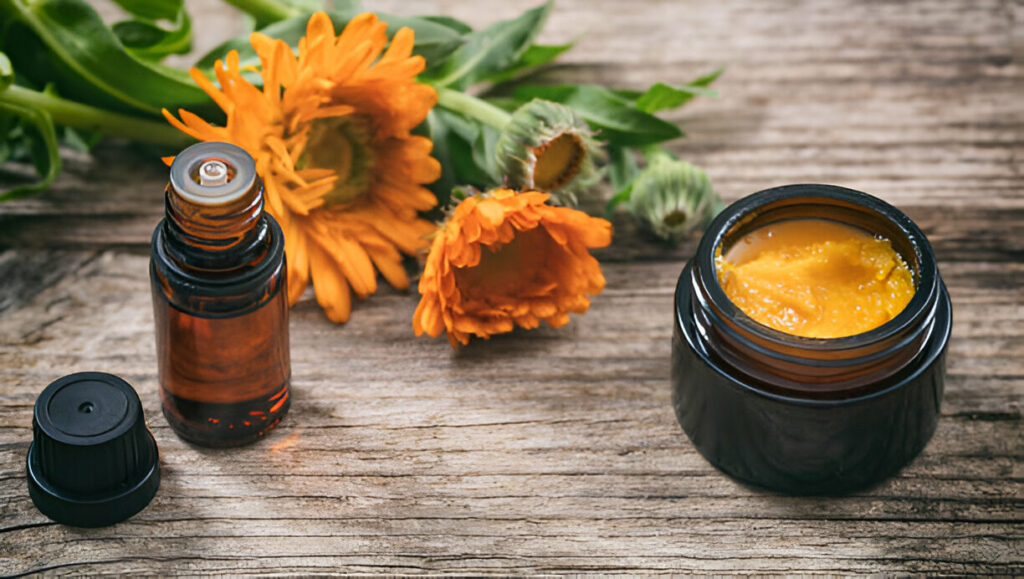
Chamomile
Chamomile provides calming effects whether you drink it as tea or use it with your toner. It has antifungal, antibacterial, and antiseptic properties that help heal minor wounds, acne, skin rashes, and inflammation. Its antioxidants protect against sun damage, reduce aging caused by free radicals, and improve skin texture. These nutrients soothe the skin and reduce redness.
Chamomile products are generally beneficial for all skin types, but people with sensitive skin may see the most improvement.
Dandelion
This antioxidant-rich plant supports your immunity, skin, and overall health. Dandelion leaves, roots, and their extracts have healing properties. They contain anti-inflammatory compounds that boost collagen production and help retain moisture. These benefits make dandelion root extracts effective against acne, skin irritation, and aging, keeping your skin smooth. A 2015 study found that dandelion leaves can prevent UVB radiation damage when applied to the skin before or after sun exposure. Read more about this feature of dandelion here National Library of Medicine.
Dandelion-infused skincare products are known for their calming effects. If you have acne-prone skin, this herbal remedy can help reduce redness and irritation. Additionally, sea moss in skin care may offer complementary benefits for hydration and soothing. However, if you’re allergic to ragweed or similar plants, check with your dermatologist before using dandelion-based products.

Holy Basil
Holy basil not only has a fresh aroma but is also rich in vitamin C, which helps prevent skin infections and irritation. Like ashwagandha, holy basil is an adaptogen herb, offering stress-reducing and anti-inflammatory benefits. It has been used in Ayurvedic medicine for a long time and is known for its antibacterial properties.
Holy basil leaves can be applied directly to the skin to reduce irritation and help with conditions like eczema and rashes. They also have skin-brightening effects that can prevent and reduce dark spots. These benefits make holy basil effective for treating acne and fighting signs of aging, such as wrinkles and fine lines.
Many toners include holy basil, making them a great addition to an acne-fighting or anti-aging skincare routine.
Lavender
Lavender, known for its calming scent, provides several skin-soothing and healing benefits. Lavender oil is used in moisturizers and serums or can be applied directly to the skin. It fights bacteria and fungi, helping to unclog pores, reduce acne and redness, and prevent future breakouts.
Lavender oil helps with chronic skin conditions like eczema and psoriasis and nourishes dry skin. Keeping your skin hydrated prevents cracks that can lead to infections. Its anti-inflammatory properties, part of lavender skin care, aid in wound healing and soothe minor burns, cuts, and insect bites by reducing swelling and cleansing the area.
Lavender also has anti-aging benefits. It can lighten the skin, promoting an even tone and reducing dark spots.

Thyme
Thyme oil helps with various skin issues due to its antifungal, antibacterial, and anti-inflammatory properties. It fights acne and keeps the skin fresh and free from germs. Its rich nutrients and cleansing qualities promote wound healing and can speed up recovery for scars, cuts, burns, and even nearly healed tattoos.
Thyme oil helps calm the skin and can relieve rashes, eczema flare-ups, and irritated patches. It prevents dry and cracked skin, which is more prone to irritation and infection, while also keeping the area free of bacteria and fungi. These benefits improve your skin texture and natural glow.
Turmeric
Turmeric, with its bright yellow color, is full of antioxidants that help your skin glow. It has anti-inflammatory properties that boost collagen production and speed up healing. These nutrients help fight acne caused by dead skin buildup or minor scarring and can also ease inflammatory skin conditions like psoriasis and eczema.
Turmeric helps control sebum (the oil produced by your skin), making it ideal for oily or acne-prone skin. Its antioxidants can prevent wrinkles, fine lines, and dark spots, making it a great addition to an anti-aging skincare routine.
Keep in mind that turmeric can temporarily make your skin yellow. It should not be used regularly with lime juice, as the combination can lighten the skin. If you’re worried about a turmeric allergy or sensitivity, talk to your dermatologist before using it.
Witch Hazel
This powerful herb could be the key to smooth and healthy skin. Witch hazel, native to North America, is made from the plant’s bark and leaves. It’s used in both teas and topical treatments. With its high levels of antioxidants and anti-inflammatory compounds, witch hazel, along with rice water for skin care, helps fight free radicals that can cause acne, eczema, psoriasis, and other skin rashes. Its tannins also help prevent skin infections, reduce dryness (including on the scalp), and protect against skin damage.
Witch hazel has antiviral and antibacterial properties that help prevent infections, breakouts, and uneven skin texture or irritation.
For the best results, use it as a daily toner combined with lavender or thyme oil.
Peppermint
Peppermint is an ancient herb with many benefits for the body. It has anti-inflammatory and antiseptic properties that help cleanse the skin and support healing.
The menthol in peppermint provides a cooling effect that soothes acne, irritation, and inflammation. It also contains vitamins A and C and Omega-3 fatty acids, which help treat oily skin. Additionally, peppermint extracts act as a moisturizer for the skin.
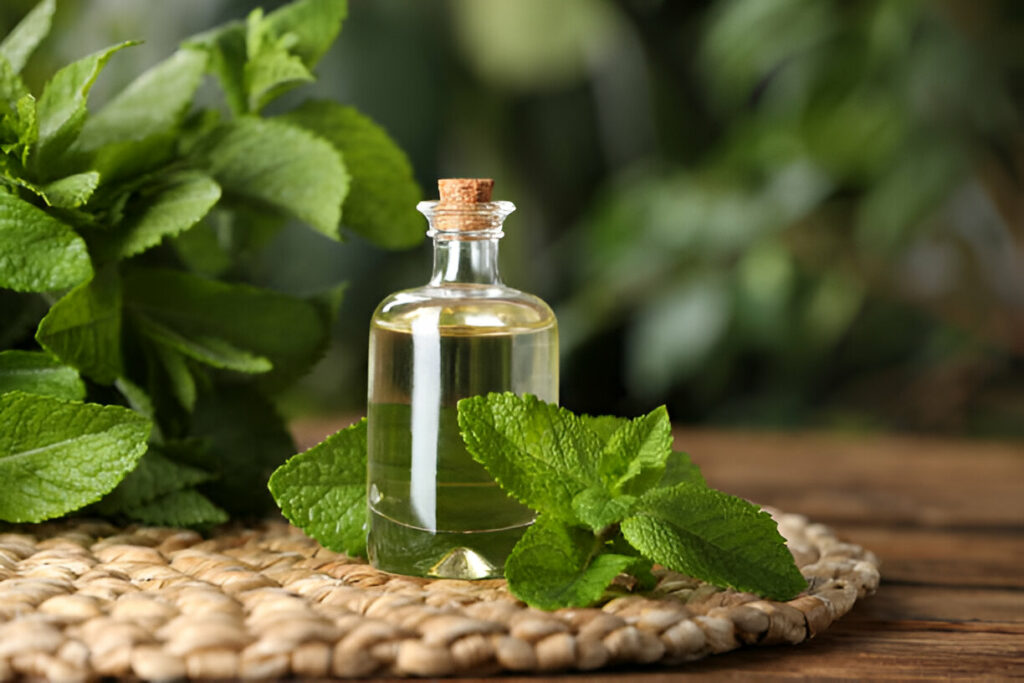
Comfrey
Comfrey has useful properties in its flowers, leaves, and roots, which are great for reducing inflammation and promoting healing. It’s ideal for dry skin and can help with bruises, burns, eczema, and open wounds. Comfrey is very soothing and healing.
Consider using comfrey herbal oil during winter, especially for skin damaged by the environment. It helps activate the healing process and can be used on dry skin, damaged skin, and skin with dermatitis.
How to Safely Blend and Apply Herbal Solutions
Proper preparation and application of herbal solutions are crucial for their effectiveness. Here’s what to keep in mind:
- Correct Ratios: Use the recommended proportions of herbs and carriers to avoid skin reactions and ensure effectiveness.
- Quality Over Quantity: Choose high-quality, organic herbs that are free from pesticides and chemicals.
- Patch Test: Always do a patch test before full application to check for any allergic reactions or sensitivities.
- Preservation: Use natural preservatives to extend the shelf life of your DIY herbal solutions.
- Application Technique: Apply using gentle, circular motions to improve absorption and stimulate circulation.
- Storage: Keep your herbal solutions in a cool, dark place to maintain their potency.
- Consultation: Talk to a dermatologist or herbal expert before adding a new herb to your skincare routine.
